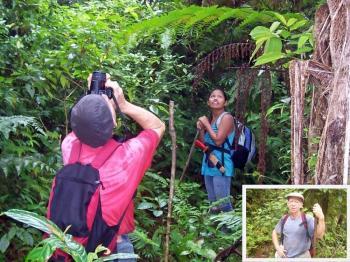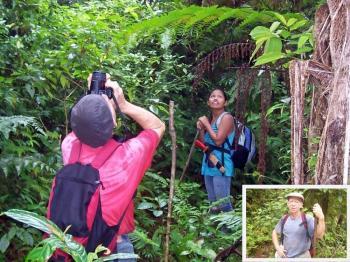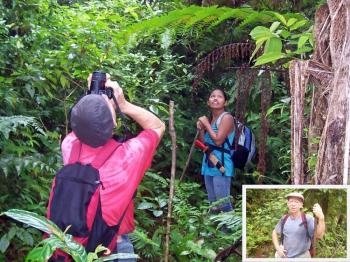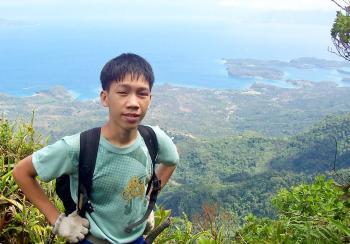PUERTO GALERA, Philippines—“Do you hear the chainsaw up in the mountain?” Ravan Schneider, the orchid hunter asks me. We both listen for a brief moment while our eyes glide over the fascinating mountain ranges trying to ascertain where the sound came from. “It would be great [if] we could find the cutting place. But this will only be possible if they keep on cutting for a while so we can follow the noise,” he adds.
We had just met early in the morning at the fringes of the rainforest, approximately 1,300 feet above sea level. Ravan arrived on his motorbike accompanied by his Filipina partner Josephine.
The chainsaw sounds up in the mountains are usually produced by illegal loggers. As disturbing as the noise might be for a nature lover like myself, for Ravan it adds an extra excitement to our hike.
For him, the illegal logging in the area is a kind of blessing in disguise. Of course he prefers a pure and serene environment—and big trees being cut in the forest means less orchid habitats. But on the other hand, freshly felled trees give Ravan the rare opportunity to find new orchids or at least take some close-up pictures after managing to locate the cutting site.
Ravan and Josephine seem well prepared for the hike: ample food and water certainly, but they’re also wearing mountain hiking boots, bush knives and anti-leech socks.
Ravan did warn me about the danger of being sucked by the little leeches, which are common in tropical rainforests. So I prepared wearing long socks and made sure they sit snuggly on top of my long jogging pants with no skin exposed. But as we kept on hiking higher and higher I got so fascinated by the surroundings—especially the change in flora and fauna from ordinary forest to rainforest, like entering a completely different and magical world—that this sense of awe made me forget about the leeches.
All I can say now, I highly recommend anti-leech socks. The little worms were able to drill their way right into the spaces in the weaving of my ordinary socks.
Feeling like Scout Rangers we hiked in the direction of the chainsaw hum, which led us to a well-marked trail left by the illegal loggers and their “carabaos” (domesticated water buffalo used to haul logs).
After about three hours, we finally found the logging area. Here Ravan had his “high time” climbing through the branches of the felled trees, taking documentary photographs using his macro lens. He usually carries more than one camera on these hunting trips.
We had just met early in the morning at the fringes of the rainforest, approximately 1,300 feet above sea level. Ravan arrived on his motorbike accompanied by his Filipina partner Josephine.
The chainsaw sounds up in the mountains are usually produced by illegal loggers. As disturbing as the noise might be for a nature lover like myself, for Ravan it adds an extra excitement to our hike.
For him, the illegal logging in the area is a kind of blessing in disguise. Of course he prefers a pure and serene environment—and big trees being cut in the forest means less orchid habitats. But on the other hand, freshly felled trees give Ravan the rare opportunity to find new orchids or at least take some close-up pictures after managing to locate the cutting site.
Ravan and Josephine seem well prepared for the hike: ample food and water certainly, but they’re also wearing mountain hiking boots, bush knives and anti-leech socks.
Ravan did warn me about the danger of being sucked by the little leeches, which are common in tropical rainforests. So I prepared wearing long socks and made sure they sit snuggly on top of my long jogging pants with no skin exposed. But as we kept on hiking higher and higher I got so fascinated by the surroundings—especially the change in flora and fauna from ordinary forest to rainforest, like entering a completely different and magical world—that this sense of awe made me forget about the leeches.
All I can say now, I highly recommend anti-leech socks. The little worms were able to drill their way right into the spaces in the weaving of my ordinary socks.
Feeling like Scout Rangers we hiked in the direction of the chainsaw hum, which led us to a well-marked trail left by the illegal loggers and their “carabaos” (domesticated water buffalo used to haul logs).
After about three hours, we finally found the logging area. Here Ravan had his “high time” climbing through the branches of the felled trees, taking documentary photographs using his macro lens. He usually carries more than one camera on these hunting trips.




